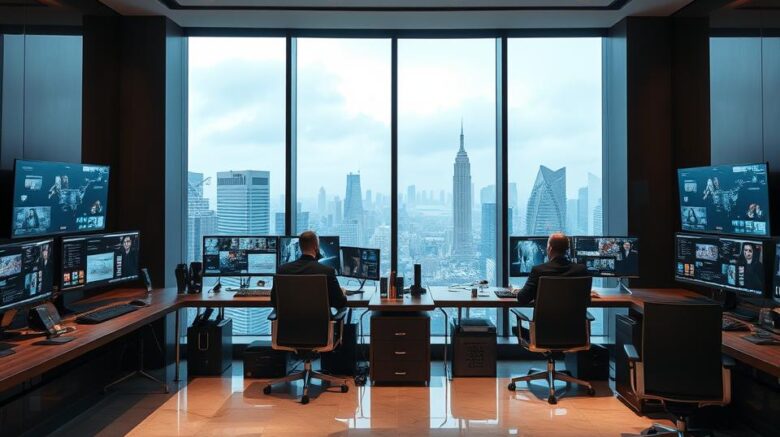Improving Safety via Hospital Security Guards
Can you imagine that hospitals deal with around 30 violent incidents per day? This alarming figure highlights the essential role of Hospital Security Guards. They defend patients, team members, and sensitive records alike. Within the ever-changing healthcare environment, effective Healthcare Facility Security is critical. It means building protected areas where patients are treated without concerns about violence or data leaks.
Partnering with experienced firms like Divine Protection Services enhances Medical Center Security Services. This ensures security stays front and center without limiting accessibility. This article examines how apartment building security solutions and surveillance systems can significantly improve security protocols. It tackles both internal and external threats effectively.

Critical Findings
- Hospital Security Guards are crucial for defending patients, staff members, and sensitive records.
- Healthcare Facility Security is essential to mitigate violent incidents and safeguard privacy.
- Integrated security solutions amplify the overall performance of hospital security services.
- Partnering with companies such as Divine Protection Services delivers personalized security strategies.
- Innovative technologies support modern medical facility security approaches.
- Juxtaposing access and confidentiality is essential for robust hospital safety protocols.
Why Hospital Security Matters
Hospital security is paramount for the well-being of patients and staff and the defense of sensitive data. The escalation of violence in medical environments points to the importance of vigilant Hospital Security Guards. These guards are essential for maintaining a safe environment and upholding the rights and dignity of everyone.
Enforcing robust Healthcare Facility Security plans is fundamental to stop violent behavior. This aids in building a supportive environment, bettering the patient and family experience. It also ensures compliance with laws like HIPAA, which mandates secure access control to protect Protected Health Information (PHI). These actions not only defend patients but also nurture trust between healthcare teams and their communities.
| Type of Security Measure | Importance | Regulatory Conformity |
|---|---|---|
| Access Control Systems | Limit unapproved entry and permissions | Crucial for HIPAA adherence |
| Surveillance Cameras | Monitor activities and deter criminal behavior | Aligns with rules for secure environments |
| Emergency Response Plans | Enable swift reaction to emergencies | In line with emergency management and safety requirements |
| Training for Security Personnel | Prepare personnel with crisis management abilities | Meets required safety and security norms |
Allocating resources to strong security protocols and personnel training is vital for safeguarding hospitals and health facilities. These guidelines secure a protected and compliant setting, key to offering top-notch patient services.
Role of Hospital Security Guards
Hospital security guards play a vital role in keeping healthcare facilities safe. They guard access ways to block unapproved entry, respond to crises, and apply conflict management to forestall risks. After receiving instruction from Divine Protection Services, they detect and handle signs of aggression or unrest.
Their role is essential in upholding the safety and welfare of patients and personnel. They protect the hospital’s operations, essential for a healing environment. By delivering security, they enrich patient care and lower risks.
Advanced Technologies in Hospital Security
Modern healthcare environments increasingly rely on Advanced Technologies to bolster security measures. Medical Center Security Services effectively integrate systems like AI-driven surveillance cameras, which enhance monitoring capabilities. These cameras offer real-time tracking and analysis, enabling staff to identify and respond to threats swiftly.
One of the key aspects of Healthcare Security Solutions is the use of access control systems. These solutions confine entry to restricted areas, ensuring that only sanctioned personnel can access crucial sections. Using biometric authentication, hospitals can incorporate another layer of protection for sensitive patient data and essential medical gear.
AI security solutions play a critical role in physical security. Biometric facial recognition and motion detection empower security officers to address breaches without delay. Sophisticated video analysis supports incident-driven decision-making, providing ongoing scrutiny of healthcare settings. This fosters a secure environment for both patients and employees.
| Technology | Application | Advantages |
|---|---|---|
| AI-driven Surveillance | Live tracking | Quick risk detection |
| Access Control Systems | Controlled access | Guarding important sections |
| Facial Recognition | Biometric verification | Stopping unapproved entry |
| Video Analytics | Operational oversight | Data-driven decision-making |
Advanced Technologies not only protect hospital assets but also contribute to creating a safe environment for all. By adopting these state-of-the-art technologies, hospitals can stay watchful for security hazards. This upholds superior patient care standards.
Healthcare Security Methods
Robust Healthcare Facility Security tactics are necessary to secure patients, personnel, and visitors within medical facilities. Carrying out in-depth risk reviews is the bedrock of these methods. By detecting flaws, healthcare institutions can formulate specialized plans for various cases. This elevates their preparedness for any possible incidents.
It’s vital to encourage reporting of unusual behaviors and threats. Hospitals should maintain processes to address such notifications promptly. This proactive view in Healthcare Facility Security cultivates a culture of shared safety.
Overseeing guest access is a vital part of Medical Center Security Services. Making sure that only permitted persons gain entry preserves a safe setting. Watching over patient-caregiver interactions helps diminish risks. This creates a safer space for all. Presented below is a table detailing the main elements of successful security strategies.
| Security Element | Description | Benefits |
|---|---|---|
| Risk Assessments | Detecting risks and evaluating probable dangers. | Boosts preparedness and response efficiency. |
| Incident Reporting | Urging the community to disclose suspicious incidents. | Enables swift threat responses and heightens vigilance. |
| Visitor Management | Standards for tracking and managing facility entry. | Strengthens safety and diminishes illicit access. |
| Staff Training | Offering safety training to staff members. | Arms employees with skills for responding to security situations. |
Preparing Security Personnel Competently
Thorough preparation of security personnel is crucial for sustaining safety in healthcare facilities. Regular instruction assists personnel in coping with evolving risks. It also boosts their ability to respond well in different situations.
Divine Protection Services stresses the importance of building keen situational awareness in security staff. This includes learning conflict management skills for high-stress interactions. Consistent practice drills and role-play exercises reinforce policies. Employees develop skills to tackle threats promptly while safeguarding dignity and respect.
This method of preparing security staff transcends mere defensive tactics. It fosters a culture of safety and professionalism in healthcare facilities. By concentrating on fundamental abilities, hospitals ensure their security officers manage challenges adeptly.
Adhering to Regulatory Standards
Adhering to Regulatory Standards is critical for medical centers striving for safety and credibility. For example, HIPAA mandates stringent access controls to safeguard Patient Health Information (PHI). These procedures stop unapproved access and guard against data leaks.
Medical centers can enhance their compliance by implementing comprehensive policies. They involve recurring reviews, personnel instruction, and transparent incident notification procedures. These steps not only ensure patient well-being but also foster community confidence.
Agencies like Divine Protection Services supply bespoke compliance strategies for hospitals. Their knowledge in Hospital Security Services guarantees that security staff are properly prepared to adhere to regulations.
Devotion to compliance mitigates risks and fosters solid patient-provider bonds. An anticipatory approach to regulations advantages the whole healthcare framework.
Hospital Security Guards at Work
Hospital Security Officers are vital in keeping healthcare facilities safe. Their actions manifest in multiple actual cases, illustrating their preemptive strategies. For example, they manage conflicts in waiting areas, resolving them quickly to prevent violence.
In tense moments, these officers escort individuals to safe places, supporting them in their time of need. This practice secures those who are vulnerable and upholds a serene atmosphere. Their teamwork with law enforcement in emergencies emphasizes the value of Professional Healthcare Security. They frequently act as initial responders.
Instruction from Divine Protection Services equips these guards to manage crises effectively. They are taught to apply regulations while preserving everyone’s dignity. This fusion of authority with compassion establishes them as indispensable to the healthcare team. They endeavor to maintain safety and security for every person in the facility.
Customizing Security Solutions for Healthcare Facilities
Healthcare facilities face unique security challenges that demand a tailored approach. Personalizing Security Solutions is crucial for meeting these challenges, creating a protected space for patients and staff. Working with experts like Divine Protection Services enables hospitals to create security programs that fit their specific needs.
A well-rounded security program covers critical areas like violence prevention and medication security. With state-of-the-art technologies, hospitals can strengthen safety protocols while remaining HIPAA-compliant. This frequently encompasses visitor oversight systems and responsive access control methods tailored to evolving needs.
The function of Medical Facility Guards is equally important. They undergo dedicated training to address security events and remain continually alert. Their presence fends off risks and comforts both staff and patients.
The following table demonstrates how Personalizing Security Solutions tackles diverse healthcare issues:
| Issue | Custom Solution |
|---|---|
| Violence Prevention | Educating Medical Facility Guards in conflict de-escalation methods |
| Medication Security | Installation of secure medication storage and monitoring systems |
| Visitor Management | High-level visitor vetting and credential issuance procedures |
| Access Control | Adaptive access control systems that adjust based on facility activity |
By strategic preparation and teaming up with the appropriate entities, hospitals can create a robust security framework. This results from Tailoring Security Solutions to their specific criteria. Integrating vigilant human oversight with technological advances markedly raises safety, fostering a secure and streamlined medical setting.
In Closing
Guaranteeing the protection and welfare of patients, employees, and private data is essential in medical centers. Hospital Security Guards currently leverage state-of-the-art technology and education to address modern dangers. This advancement not only shields physical premises but also strengthens trust between patients and healthcare professionals.
Adapted Healthcare Security Solutions assist hospitals in remaining at the forefront of the changing security scene. Collaborating with seasoned organizations such as Divine Protection Services arms healthcare centers to manage safety challenges proficiently. By combining staff development with leading-edge technology, hospitals can create a secure atmosphere for healing and care.
The healthcare industry encounters mounting threats, making skilled security strategies crucial. Hospitals have to integrate these progressing strategies to fortify their environments and uphold operational honor.
